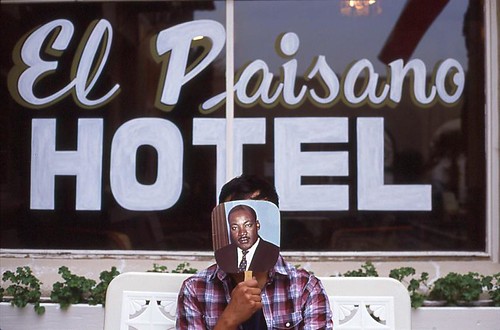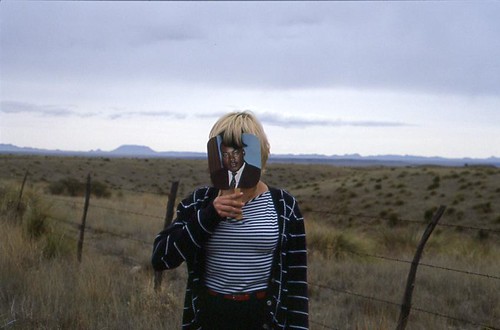—Only hatred strengthens life, and destructive hatred maintains constructive life. In it we feel strong, able to kick up everything; in it all of our limbs burn; hatred calls us to action, it encourages us to make a gesture and act. This is not the interested hatred, provoked by mean causes and oriented towards an immediate act of revenge, but the grand passionate hatred, under which everything trembles. Hatred is the main spring of prophecy; hatred makes every prophet talk passionately about love. Prophecy is a hatred that is both destructive and creative. The Jews would have perished a long time ago if they hadnʼt the divine gift of hatred. To the chosen people God ensured eternity through hatred. To us, the Christians, God gave a transitory existence through the curse of love. Jesus came for the Jews, not for us. Their God sent us the great seducer. How inspired were the Jews when they refused the Messiah.
The Book of Delusions
by
E. M. Cioran
*
Taiwanese artist Yin-Ling Hsu


*
Japanese artist Satomi Shirai



*
Jackie Young lives in Austin, Texas


*
MP-R: Can a narrative, especially a short narrative, be rigorous in a philosophical sense?
Borges: I suppose it could be. Of course, in that case it would be a parable. I remember when I read a biography of Oscar Wilde by Hesketh Pearson. Then there was a long discussion going on about predestination and free will. And he asked Wilde what he made of free will. Then he answered in a story. The story seemed somewhat irrelevant, but it wasn’t. He said — yes, yes, yes, some nails, pins, and needles lived in the neighborhood of a magnet, and one of them said, “I think we should pay a visit to the magnet.” And the other said, “I think it is our duty to visit the magnet.” The other said, “This must be done right now. No delay can be allowed.” Then when they were saying those things, without being aware of it, they were all rushing towards the magnet, who smiled because he knew that they were coming to visit him. You can imagine a magnet smiling. You see, there Wilde gave his opinion, and his opinion was that we think we are free agents, but of course we’re not….
But I would like to make it clear that if any ideas are to be found in what I write, those ideas came after the writing. I mean, I began by the writing, I began by the story, I began with the dream, if you want to call it that. And then afterwards, perhaps, some idea came of it. But I didn’t begin, as I say, by the moral and then writing a fable to prove it.
On April 14, 1976, Denis Dutton and Michael Palencia-Roth
interviewed
Jorge Louis Borges
*
The Experimental Drumkit Parts 1 & 2
*
Allyson Mellberg Taylor and Jeremy Taylor

*
Parisian artist Aude Mercier




*
Photographer Zoren Gold and graphic artist Minori Murakamimet in Los Angeles and started collabrating as a photographer duo since 2000. The duo had been based in Tokyo for the past 7 years.
Now, they live and work in Los Angeles.



*
Matthew Stone is an artist and shaman based in London


*
Bon Duke was born and raised in NYC



*
Tanyth Berkeley


*
Dutch artist Anne Smolders


*
LCD Soundsystem - "Drunk Girls"
directed by Spike Jones
*
Kaeleen Wescoat-O'Neill
born october 15, 1984
lives and works in sierra madre, ca



*
Winnie Truong
b. 1988 Toronto, Canada



The Book of Delusions
by
E. M. Cioran
*
Taiwanese artist Yin-Ling Hsu


*
Japanese artist Satomi Shirai



*
Jackie Young lives in Austin, Texas


*
MP-R: Can a narrative, especially a short narrative, be rigorous in a philosophical sense?
Borges: I suppose it could be. Of course, in that case it would be a parable. I remember when I read a biography of Oscar Wilde by Hesketh Pearson. Then there was a long discussion going on about predestination and free will. And he asked Wilde what he made of free will. Then he answered in a story. The story seemed somewhat irrelevant, but it wasn’t. He said — yes, yes, yes, some nails, pins, and needles lived in the neighborhood of a magnet, and one of them said, “I think we should pay a visit to the magnet.” And the other said, “I think it is our duty to visit the magnet.” The other said, “This must be done right now. No delay can be allowed.” Then when they were saying those things, without being aware of it, they were all rushing towards the magnet, who smiled because he knew that they were coming to visit him. You can imagine a magnet smiling. You see, there Wilde gave his opinion, and his opinion was that we think we are free agents, but of course we’re not….
But I would like to make it clear that if any ideas are to be found in what I write, those ideas came after the writing. I mean, I began by the writing, I began by the story, I began with the dream, if you want to call it that. And then afterwards, perhaps, some idea came of it. But I didn’t begin, as I say, by the moral and then writing a fable to prove it.
On April 14, 1976, Denis Dutton and Michael Palencia-Roth
interviewed
Jorge Louis Borges
*
The Experimental Drumkit Parts 1 & 2
*
Allyson Mellberg Taylor and Jeremy Taylor

*
Parisian artist Aude Mercier




*
Photographer Zoren Gold and graphic artist Minori Murakamimet in Los Angeles and started collabrating as a photographer duo since 2000. The duo had been based in Tokyo for the past 7 years.
Now, they live and work in Los Angeles.



*
Matthew Stone is an artist and shaman based in London


*
Bon Duke was born and raised in NYC



*
Tanyth Berkeley


*
Dutch artist Anne Smolders


*
LCD Soundsystem - "Drunk Girls"
directed by Spike Jones
*
Kaeleen Wescoat-O'Neill
born october 15, 1984
lives and works in sierra madre, ca



*
Winnie Truong
b. 1988 Toronto, Canada


